


A parking lot for self-drive tourists near the Shennongjia Nature Reserve in Hubei province.[Photo/China Daily]
"SUVs have been replacing sedans as they can carry more people and more equipment, such as tents, fishing rods and barbecue kits.
"They can handle any terrain, too, such as muddy roads in the mountains."
SUVs have accounted for around 30 percent of the growth in private car sales since 2014, according to data from Nomura International (Hong Kong) Ltd.
As a result, there has also been a rise in demand for tourist facilities aimed at self-driving families with children.
In Hangzhou, for instance, several hotels and resorts offer packages that include items such as hiking, fishing, riding and biking, admission tickets to shows and art performances, or lake cruises, as well as all food and board.
"Hotels and resorts are seeing more children staying than ever before. Self-driving makes traveling with children much easier, and these younger travelers nowadays are much more widely exposed to the world than their parents," said Chen Gang, deputy head of Ningbo Tourism Bureau.
"The needs of children are often the most important consideration when families choose their destinations."
The most confident self-drive tourists are also trying to explore the world by car, marking another huge growth opportunity for tour operators.
"We have seen a rising demand for overseas car-rental services, international driving license applications and international car insurance," said Lin Aili, the manager of Shanghai Lijiang Travel Ltd.
"Although less than 1 percent of self-drive tourists are doing their driving overseas, I expect those numbers to surge, as that type of holiday gains popularity among increasingly well-traveled Chinese tourists."
 |
 Top 10 nominated designs at BJDW
Top 10 nominated designs at BJDW Fashion show staged in Forbidden City at night
Fashion show staged in Forbidden City at night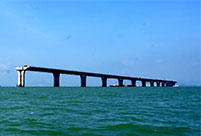 Construction of HK-Zhuhai-Macao Bridge enters final stage
Construction of HK-Zhuhai-Macao Bridge enters final stage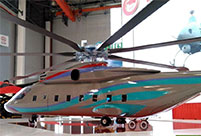 Model of heavy-lift copter makes debuts at Tianjin expo
Model of heavy-lift copter makes debuts at Tianjin expo Art photos of Chinese beauty in Han Chinese clothing
Art photos of Chinese beauty in Han Chinese clothing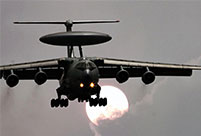 Stunning photos of air show in China’s V-Day parade
Stunning photos of air show in China’s V-Day parade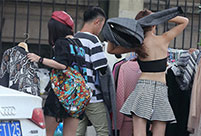 Models change clothes on street in Hangzhou
Models change clothes on street in Hangzhou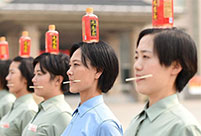 Charming Chinese female soldiers
Charming Chinese female soldiers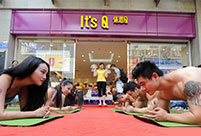 Beauty vs. muscular man
Beauty vs. muscular man Rising to the challenge
Rising to the challenge Rand report echoes Cold War mind-set, overstates threats
Rand report echoes Cold War mind-set, overstates threats Inland nuke plants crucial to energy future
Inland nuke plants crucial to energy future Communist confrontation
Communist confrontationDay|Week